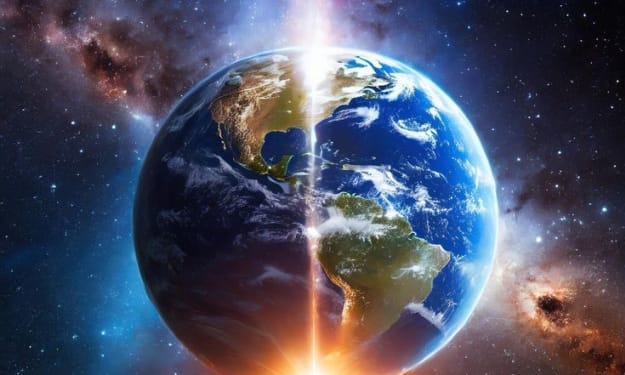What is the origin of oil (and no, it does not come from dinosaurs)
here you will find several interesting facts

Known as “black gold”, it is a mixture of hydrocarbons, compounds that contain in their molecular structure mainly carbon and hydrogen.
It is a motor of today’s society, a motive for wars, and one of the main drivers of climate change.Every day more than 80 million barrels of oil are produced in the world, whose name comes from the Latin and means “stone oil”. This viscous liquid known as “black gold” is a mixture of hydrocarbons, compounds that contain in their molecular structure mainly carbon and hydrogen.
Oil is the product of a process of processing over millions of years. But where does it come from?Most scientists are in favour of a theory and assure that the origin of oil “is well understood”. But that didn't stop some false beliefs from circulating...
The myth of dinosaurs
It is estimated that about 70% of the current crude deposits were formed in the Mesozoic or Mezozoic Era, which extended between 252 and 66 million years ago.
The Mesozoic, which is divided into the Triasic, Jurassic and Cretaceous periods, is also known as the reptile era and in it dinosaurs had their apogee. This could explain why misinformation has circulated.
“For some strange reason, the idea that oil comes from dinosaurs has remained in many people. But oil comes from trillions of tiny algae and plankton,” said Reider Müller, a geology professor at the University of Oslo.
No one knows for sure how this myth was born, but it also circulated in Latin America.BBC Mundo asked two Mexican experts if they were aware of that belief. “Yes, it’s a misconception, but very common,” said Darío Solano and Iza Canales, professors at the Faculty of Engineering at the National Autonomous University of Mexico, UNAM, in the Division of Earth Sciences.
“At least within our community, we can identify that many of the rocks that generate hydrocarbons are found in layers of the Jurassic, which is a geological time period that is usually associated with dinosaurs, and that is the relationship that has helped reinforce the idea that this is their origin,” Solano explained.
“It is important that these myths are dismissed, firstly to help society as a whole eliminate ignorance of a substance of common and widespread use, in short, only by general culture. Secondly, by advancing in understanding the origin of this resource, it will be possible to advance in the development of new technologies or uses,” added Canales.
How oil is formed
The protagonists in the history of the origin of oil are not the big reptiles but tiny beings.The most accepted theory about the origin of oil is the organic term, according to which the resource originated from the decomposition of the remains of animals and microscopic algae accumulated on the bottom of seas and lagoons.
This theory indicates that fine sediments and organic residue, mainly terrestrial or marine vegetables, are deposited in a basin. After certain processes the kerogen is formed, which is a mixture of these organic materials, and after a long time the pressure and temperature are increased, eventually forming hydrocarbon chains, the scientists of UNAM explained.
The accumulation of other geological layers on the deposits of organic matter generates pressure and temperature conditions that facilitate the action of anaerobic bacteria to slowly transform organic material into hydrocarbons with small amounts of other elements.
“In a simplified way, we can think of cooking our mixture of materials in an express pot (i.e. with certain pressure and temperature conditions) for a long time, until the original material is broken down into carbon and hydrogen chains. Something similar is happening in the basement. Then the material needs to migrate from the rocks where it was cooked to the rock that will store it,” explained Mexican experts.This theory is one of the most accepted, since all the oil deposits are found in sedimentary land and, in addition, there have been found fossil remains of animals and plants.
Where does the energy in oil come from
Oil can also come from the processing of organic material from ancient forests. Within organic theory it is understood that any type of organic material can be present. In fact, the kind of hydrocarbon that is obtained from kerogens rich in terrestrial plant matter is associated with gas deposits, Mexican scientists added.
And here's another myth to clarify. Is the energy in oil the solar energy captured in photosynthesis by the phytoplankton (plant organisms) and transferred to the zooplancton (animal organisms)? “No, this is a misconception,” said Canales, adding: “The energy we obtain today from oil is obtained by the oxidation (combustion) of hydrogen and carbon (hydrocarbons) chains.”
“It’s true that energy and matter are interchangeable, but to say so sounds like phytoplankton and zooplancton are solar batteries. It can rather be thought of as an analogue to how humans can eat many things and the body transforms food by breaking it down in our digestive system through another process of oxidation (digestion) and our body takes advantage of those simpler components at the cellular level,” Solano added.
IMAGES
Alternative theories
Some scientists held in the past that oil has an inorganic origin and is formed in the depths of the Earth without the need for remains of living organisms. Several of these theories were proposed as early as the 19th century, for example by Dmitry Mendeleev, the Russian chemist who published the first periodic table of elements.
Inorganic theories argue that inside the Earth's mantle, coal may exist as hydrocarbon molecules, mainly methane, and a large amount of hydro-carbons found in oil may be generated by processes that do not regulate organic fossils.
Inorganic theories argue that inside the Earth's mantle, coal may exist as hydrocarbon molecules, mainly methane, and a large amount of hydro-carbons found in oil may be generated by processes that do not regulate organic fossils.
The Asteroid That Ended the Dinosaurs Also Generated a Monstrous Earthquake
These hydrocarbons can migrate out of the mantle to the terrestrial crust to escape to the surface or remain in waterproof layers, forming oil deposits. One version of these theories is that of the Austrian astrophysicist Thomas Gold (1920-2004), who was a professor of astronomy at Cornell University.
Gold published a study in 1992 in PNAS, the journal of the American Academy of Sciences, which he later expanded into a book with the same title, Deep Hot Biosphere. For him, hydrocarbons on Earth are not the by-product of biological waste (“fossil fuels”), but were a common constituent of the materials from which the Earth was formed about 4.5 billion years ago.
Gold acknowledged that the same hypothesis had already been supported in the 1950s by Soviet scientists. The theory of the inorganic origin of oil is not accepted by most scientists “We dare to speak on behalf of our fellow academics and scientists to say that the theories of inorganic origin have not been successfully tested and that in this way it has not been possible to generate hydrocarbon in a laboratory,” said UNAM experts.
One last doubt?
Given that the organic theory of the origin of oil is the most accepted, some readers might ask themselves this question. If dinosaurs lived at the same time as the formation of oil in the Mesozoic, it could have happened that their remains, organic matter of some dinosaur, fell to the bottom of the sea or lagoons and underwent a process of compression and transformation turning into oil.“In fact, we could say that any organic matter could be present in oil generation,” said UNAM experts.
“ it is important to mention that oil generation is a very delicate process, and it requires very large volumes of matter, which were possible to reach only by the large volume of plankton in the sea, so volumes from other sources are not so significant,” they concluded.
About the Creator
Enjoyed the story? Support the Creator.
Subscribe for free to receive all their stories in your feed. You could also pledge your support or give them a one-off tip, letting them know you appreciate their work.






Comments (1)
An interesting content.